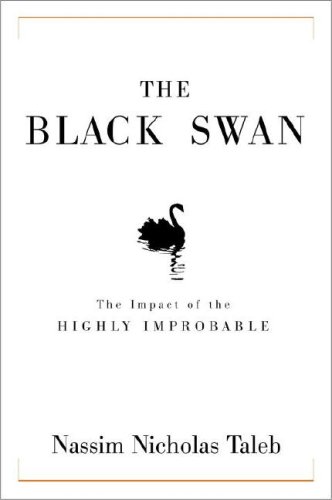The Black Swan - Nassim Nicholas Taleb

Just finished reading the black swan by Nassim Nicholas Taleb. General impressions first! It is a book that really changed the way I think about many things, in particular (and but of course) how to look at uncertainty and randomness. Taleb rants quite a bit and spares no chance to make a dig at people whom he disagrees with, even if they are prominent and respectable people in society today. (I googled one of the names of a judge thinking that he was a severely flawed individual but instead read glowing writings about him online.)
To distill Taleb's ideas, they revolve around the irony that we are blindy confident about our inability to predict the future. The ideas can be broadly listed as follow:
(i) Humans are natural story weavers - we have to rationalise issues ex-post. The problem here is that events make perfect rational sense when we look backwards. This creates a false sense of certainty that removes the important role played by randomness. We in turn project this false sense into the future and overestimate our ability to predict.
(ii) Taleb's Ludic fallacy - using simple games and probability frameworks that we learn to model the world - which is a lot more complex.
(iii) The world is alot more complex. In fact, it is not just complex, but many events don't follow the simplistic bell-curve that we forcefully fit the world into. There are several reasons why the bell-curve doesn't work. It only measures probability, but not the impact of the event. It also underestimates the frequency of such "low-probability" events. Mechanisms such as the tournament effect (where winner takes a disproportionate amt of returns) and the benefits of early wins (events don't occur independently) skew the tail-ends of the bell-curve, making improbable events more likely and more impactful.
(iv) In addition, when analysing and predicting the future, we artificially limit the scope that is being examined and use that to project. However, such a model ignores the so-called "unknown unknowns" - things that we can't even incorporate into the model because we don't even know what they are. However, it is precisely these things that drive the world and its history! e.g. The rise of the internet, world wars, the financial meltdown.
And I guess the next question to ask is so what! :) What should I do now that I know that Black Swans abound! Here's where I like Taleb's idea of segmenting Black Swans into positive and negative ones. The positive ones are those that can generate enormous windfalls some of the time, but costs a little most of the time. The negative ones are no better described than Taleb's example of "picking pennies before steamrollers". You win small most of the time, but one unlucky event will blow you out of the water. For now, I'll just focus on the positive ones.
And the lesson is surprisingly simple. Black Swans are a product of randomness. To reap the rewards of positive Black Swans, one has to bid one's time by exposing oneself to as many events that hold the potential of positive Black Swans as possible. (an immediate example would be expending my energy to network with people. who knows who i'll meet next!)
Labels: Readings


0 Comments:
Post a Comment
<< Home